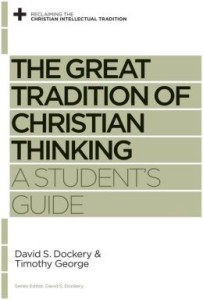Reclaiming the Christian Intellectual Tradition series, by various authors. Crossway, 2012-2016, 110-140 pages each. Age/interest level: 16-up.


What’s a “Christian intellectual tradition”? And who needs it? I was raised in an ultra-conservative, legalistic church that claimed to have restored New Testament Christianity after centuries of unbiblical drift. Occasionally I would get some church history, in which reformers like Martin Luther would be commended for their stand against the Roman church but still regarded as deficient in their understanding of the true faith. I received the distinct impression that the 2000 years of Christian tradition was mostly human error that had to be cleared away so we could get our doctrine directly from God again. No creed but Christ, no rule but the Bible itself. If it weren’t for an early encounter with Lewis’s Mere Christianity, I may have graduated college with no clue that Christianity even had an intellectual side.
Sounds crazy, but something like that is the dominant mindset among independent, interdenominational, nondenominational, and community churches today.
I’ll admit that “intellectual tradition” of any kind can seem like a luxury and an affectation to those who are struggling to raise a family in a hostile culture. It’s easy to forget that we are commanded to love God with our mind as well as our heart, soul, and strength; God created integrated beings who love according to reason and reason their way to love. Sin divides, both without and within; we tend to separate body from spirit, mind from heart, taking our cue from the ancient gnostic tradition (still alive and well) rather than the whole counsel of God and the Holy Spirit’s witness in history. The “Christian intellectual tradition” reveals the Spirit at work through every century, not just the first. The church is being built continually, always challenged and always seeking new ways to meet the challenges.
But without an intellectual foundation, we can neither reason with others nor think through issues for ourselves. One particular weakness I’ve noticed in modern thought (if you can call it “thought”) is that we’re losing the ability to make distinctions. What’s the difference, for instance, between the condemnation of homosexual acts and the prohibition against wearing wool/linen blends, both found in Leviticus? How do we determine what is for its time and what is lasting? What qualifies as nit-picking (on the order of debating how many angels can dance on the head of a pin) and what as “rightly dividing the word of truth”?
In the introductory volume of this series, The Great Tradition of Christian Thinking, David Dockery and Timothy George see Christians, even in faith-based colleges, “giving up the cognitive focus on Christian thought in favor of Christian piety and activism.” But we are integrated beings, and without understanding how to think about the great issues of our day in a disciplined fashion, our piety and activism is vulnerable to “mission drift” or outright apostasy. This little book shows how doctrine has developed in response to heresy and error, beginning with the Apostle Paul and continuing through the church fathers, Augustine, Martin Luther, and all the way up to the present day.
The series anticipates a volume for all the major areas of study. Available now are Christian Worldview, Philosophy, The Liberal Arts, Art and Music, Political Thought, Literature, and Ethics and Moral Reasoning. Yet to come are Psychology (available this November), Natural Sciences (January 2015), and Biblical and Theological Studies (March 2016). In less than 130 pages (Literature is the longest, which makes me feel relevant), each book surveys the development and impact of Christian thought in these areas. Thought and discussion questions, index, and suggestions for further reading are included.
The books are recommended for “students,” but we’re all students. Plenty of future auto mechanics and plumbers would benefit from having their worldview refined and polished. At about $9 apiece (from the publisher), or $11.99 suggested retail price, it’s cheap liberal-arts education and valuable for future reference.
Be sure and check back with us on Friday for some graduation gift ideas!
Stay Up to Date!
Get the information you need to make wise choices about books for your children and teens.
Our weekly newsletter includes our latest reviews, related links from around the web, a featured book list, book trivia, and more. We never sell your information. You may unsubscribe at any time.
Support our writers and help keep Redeemed Reader ad-free by joining the Redeemed Reader Fellowship.
Stay Up to Date!
Get the information you need to make wise choices about books for your children and teens.
Our weekly newsletter includes our latest reviews, related links from around the web, a featured book list, book trivia, and more. We never sell your information. You may unsubscribe at any time.
FREE Bible Guide!
Get a guide to the Best Bibles for Children and Teens. Perfect for an Easter gift.
We'd love to hear from you!
Our comments are now limited to our members (both Silver and Golden Key). Members, you just need to log in with your normal log-in credentials!
Not a member yet? You can join the Silver Key ($2.99/month) for a free 2-week trial. Cancel at any time. Find out more about membership here.
2 Comments
Leave a Comment
You must be logged in to post a comment.


Thanks for the timely post….Just found graduation gifts for some precious young people in our lives (one of whom is our homeschooled first born and off to a private liberal arts college this fall). We;re always on the look out for great tools. Also, got ND Wilson’s latest, Douglas Wilson’s Beowulf, and preordered Tolkien’s Beolwulf. Thanks so much for helping us think Christianly. Let’s all pray that our children will do so and be lights in some very dark places.
Thanks, Connie–we’re honored to be of help!